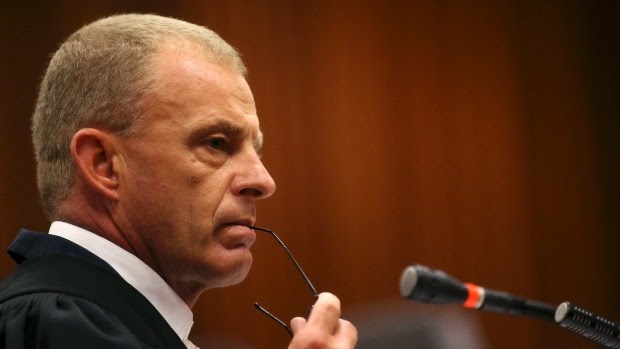In an article, “Oscar Pistorius's Cross-Examination” written by Jeralyn and reported on www.talkleft.com, written at the time when Gerrie Nel was cross examining OP during the trial shows that, far from judicial error, this case was lost by a prosecutor who thought he was bigger than the law. It was this prosecutorial failure that led to the judge acquitting OP of murder.
I often wondered why Barry Roux didn't object to Gerrie Nel's cross of OP. Now I realize that Barry Roux just gave Gerrie Nel rope to hang himself. And the gullible press and public who were effusive in their praise of the prosecution now are left to consider the outcome of a prosecutor who believed in his own hype. In the end he failed Reeva and her family.
The mainstream press was effusive in its praise of Gerrie Nel at the time and in awe of his “bulldog” approach to in his cross-examination of Oscar Pistorius. Remember Judge Masipa warned Nel, “You possibly think this is entertainment. It is not. Please restrain yourself.”
As the article points out, “It's not the prosecutor's job to tell a defendant to accept responsibility for the crime for which he's on trial and denies committing. It's his job to ask questions and test his version of the facts. Unless a defendant's story is so rehearsed it never changes, there are obviously going to be minor discrepancies. It's not surprising that Oscar's memory is better on what led up to the shooting than during the moments of trauma afterwards when he realized Reeva was dead … Mis-remembering some details does not make one a liar. It makes one human."
And then, written in April 2014, the writer of the article makes a prediction: “I don't see a premeditated murder case here. As to the lesser offense of [common law] murder, that's a tougher call. But it seems to me the prosecutor overcharged the case and the testimony of most of his witnesses (particularly the neighbors) were inconsistent with each other. The media's praise of him and his bombastic style is misplaced. He's just substituting theatrics for his lack of proof, and throwing everything he can think of against the wall, hoping something sticks.
The judge has not hesitated to rein in the prosecutor. His approach may sell with the public, but it remains to be seen whether it helps or hurts his case with the judge -- the only person whose opinion matters in the end.”
In the end the judge was not impressed, the state failed to prove its case and accused acquitted of murder. Directing anger at the judge and calling her names is misplaced. The failure here was on the prosecution's side: prosecutorial hubris: a prosecutor who came to the table with nothing in his hand, went all in and lost.


